Exploring Syrup Alcohol: A Comprehensive Guide
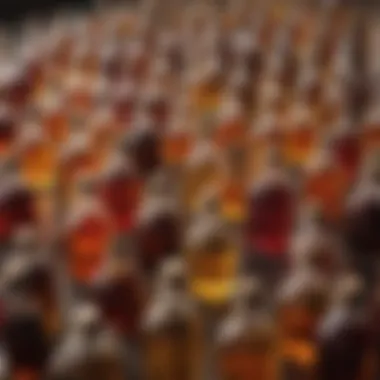
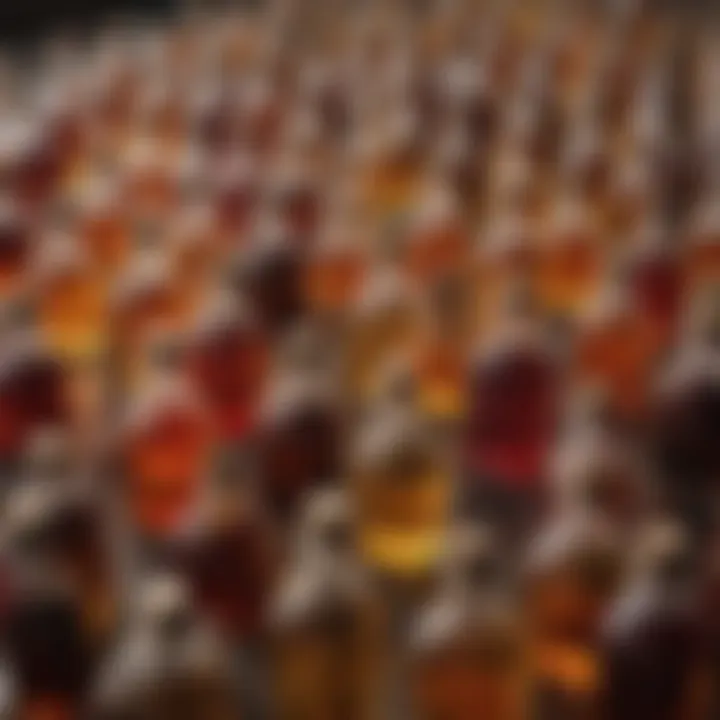
Intro
Syrup alcohol is an intriguing realm within the alcoholic beverage landscape. It combines sweetness and spirit, offering a novel approach to enjoyed drinks. As food enthusiasts seek out unique flavors and experiences, syrup alcohol stands out. It serves as a bridge between traditional alcohol and inventive culinary applications.
In this exploration, we will break down the components of syrup alcohol. From its base ingredients to preparation methods, each facet enriches understanding. Additionally, the article will discuss how syrup alcohol interacts with various cuisines. This dialogue on flavors opens opportunities for unique recipes and innovative cocktails.
Health and moderation will also play a pivotal role in our discussion. With the rising awareness surrounding responsible drinking, syrup alcohol can fit into a balanced lifestyle. However, knowledge of its composition is crucial to appreciate its nuance.
The aim here is not only to inform but also to inspire creativity in using syrup alcohol as an ingredient. This guide offers insights that will appeal to both seasoned mixologists and curious home cooks alike.
Through a structured approach, we invite you to discover the multitude of possibilities that syrup alcohol offers to any culinary setting.
Preamble to Syrup Alcohol
Syrup alcohol is an intriguing category of flavored alcoholic beverages that deserves careful exploration. It represents a fusion of culinary art and craft distillation, allowing for a wide range of flavors that can enhance various drinks and dishes. Understanding syrup alcohol can open doors to creative applications that resonate well with food lovers.
This section serves as an important gateway into the broader discussion of syrup alcohol. It highlights why syrup alcohol is significant for both mixologists and chefs. Its versatility as an ingredient makes it a valuable addition to the culinary landscape.
Defining Syrup Alcohol
Syrup alcohol is essentially a sweetened alcoholic beverage created from the infusion of fruits, herbs, or spices in a base alcohol. It can be understood as a combination of syrup and alcohol, whereby the former adds flavor and sweetness while the latter contributes to the intoxicating quality of the drink. The balance between flavor, sweetness, and alcohol content defines the success of these beverages.
The creation of syrup alcohol usually involves specific processes like maceration, where components such as fruits are soaked in alcohol to extract their flavors. Over time, different techniques have emerged for crafting these unique drinks. As a result, you can find syrup alcohol in various forms that cater to distinct palates.
Historical Context
The origins of syrup alcohol trace back to ancient times. Cultures around the world have experimented with sweetened fermented beverages for centuries. The earliest examples can be found in regions where fruits were abundant and the process of fermentation was known. Syrups, particularly fruit-based, were often used to mask the harsher flavors of early alcoholic concoctions.
As trade routes expanded, various countries influenced each other's beverage production. European nations, especially France and Italy, began developing syrup alcohol in a more refined manner. During the 19th century, the craft of mixing syrup alcohol evolved further, paving the way for cocktails as we know them today. Understanding this historical context allows modern consumers and creators to appreciate the rich legacy of syrup alcohol.
"Syrup alcohol is not just a beverage; it is a reflection of cultural influences and a canvas for creativity in culinary arts."
Today, syrup alcohol has found a place not only in drinks but also in various culinary applications. Its impact is widespread, extending from classic cocktails to contemporary gastronomy.
The Chemistry of Syrup Alcohol
Understanding the chemistry of syrup alcohol is crucial for both its enthusiasts and producers. This knowledge not only aids in creating flavorful products but also in appreciating the underlying processes that give rise to various syrup alcohols. Chemistry influences the taste, aroma, and even the texture of these beverages. Awareness of chemical interactions aids in the development of unique flavors and ensures consistent quality in production.
Ingredients and Composition
Syrup alcohol is primarily composed of several key ingredients that contribute to its distinctive character. These include sugars, flavoring agents, and alcohol derived from yeast fermentation. The sugars can come from various sources, such as fruit, herbs, or even grains. Commonly, high-fructose corn syrup, cane sugar, or natural fruit juices are used to create the base syrup.
The flavoring agents are essential as they define the syrup alcohol's identity. It can range from lush, ripe fruits like strawberries and peaches to more complex ingredients like rosemary or lavender. Each element adds to the sensory profile of the final product. Alcohol content usually hovers between 10% and 30%, providing a satisfying kick without overpowering the flavors.
Fermentation and Distillation Processes
The processes of fermentation and distillation are pivotal in the creation of syrup alcohol. Fermentation begins with yeast consuming the sugars present in the syrup. As yeast metabolizes sugar, it produces alcohol and carbon dioxide. This stage is vital, as the choice of yeast can significantly impact the flavor profile, with different strains imparting unique qualities.
Once fermentation is complete, distillation comes into play. This process involves heating the fermented liquid to separate the alcohol from the rest of the mixture. The alcohol vapor rises and is collected, then cooled back into liquid form. Distilling to the right alcohol percentage is critical, as it not only influences the drink's potency but also its mouthfeel and finish.
In summary, the chemistry behind syrup alcohol encompasses its ingredients and the processes used to create it. This knowledge lays the groundwork for understanding its application in cocktails, culinary dishes, and beyond. By appreciating these elements, enthusiasts can better experiment with flavors and ingredients to achieve personal and innovative results.
Types of Syrup Alcohol
Understanding the types of syrup alcohol is crucial for appreciating its diverse applications in gastronomy and mixology. Each category presents distinct flavors and uses, enabling culinary creativity and exploration. The significance lies in how they enhance beverages and dishes, as well as their cultural implications.
Fruit Syrups
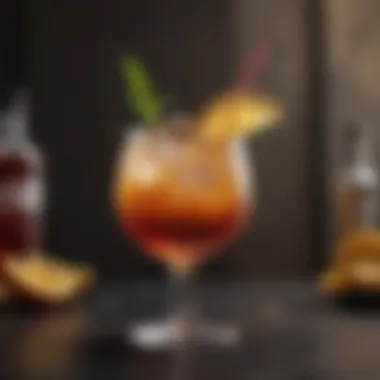

Fruit syrups are among the most popular types of syrup alcohol, known for their vibrant flavors and versatility. These syrups are made by infusing alcohol with various fruits, which creates a natural sweetness and distinctive character. Common fruits used include berries, citrus, and stone fruits. Each fruit brings its own essence, making them suitable for various cocktails and culinary applications.
The process typically involves macerating the fruit to extract its juices, which are then combined with alcohol. This method preserves the fruit’s taste while adding depth to the beverage. Furthermore, many fruit syrups can complement desserts. For example, a raspberry syrup can be drizzled over panna cotta or used in cocktail recipes like a berry mojito.
Herbal and Spiced Syrups
Herbal and spiced syrups offer an alternative approach to syrup alcohol. These syrups are created by infusing spirits with herbs, botanicals, or spices. This category allows for a broad range of flavors, from the refreshing taste of basil to the warmth of cinnamon. Each infusion can evoke a different sensation and can be used to enhance both drinks and dishes.
This variety can be particularly interesting in crafting cocktails, as herbal and spiced syrups can add complexity. For example, a thyme-infused syrup can elevate a gin and tonic, bringing a sophisticated twist. Likewise, spiced syrups are often used in seasonal drinks, providing warmth and richness during colder months.
Seasonal Variants
Seasonal variants of syrup alcohol reflect the ingredients available at different times of the year. They capture the essence of the seasons through flavor profiles. For instance, pumpkin spice syrup is a popular choice in autumn, while lavender syrup may be favored in summer cocktails.
Using seasonal ingredients not only supports local agriculture but also allows for creativity in drink making. Seasonal variants can inspire limited-time offerings in bars and restaurants, encouraging customers to experience unique flavors. These syrups can be incorporated into various dishes, from salads to desserts, making them a versatile addition to any kitchen.
"Syrup alcohol is not just an ingredient; it is a bridge to connect various culinary traditions and practices."
Crafting Syrup Alcohol
Crafting syrup alcohol is a pivotal theme within the broader context of understanding this unique beverage category. It encompasses various methods and techniques that individuals can use to create their own syrup-infused alcoholic drinks. This section aims to demystify the process of home preparation and showcase the benefits of crafting syrup alcohol. The hands-on approach allows enthusiasts to customize flavors according to personal preferences, which can elevate their drinking experience. Moreover, it empowers them to appreciate the artistry behind these beverages, fostering a deeper connection with the ingredients and processes involved.
Basic Recipes for Home Preparation
Creating syrup alcohol at home can be a rewarding endeavor. Here are some basic recipes to get started:
- Simple Fruit Syrup
- Herb-Infused Syrup
- Spiced Syrup
- Combine equal parts of fresh fruit and granulated sugar in a saucepan.
- Add water to cover the fruit and bring to a boil.
- Reduce heat and let it simmer for about 10-15 minutes until the fruit releases its juices.
- Strain the mixture to extract the syrup and allow it to cool before mixing with alcohol.
- For herb syrups, use a similar method as fruit syrups.
- Combine fresh herbs like mint or basil with sugar and water, bringing it to a boil.
- Strain once cooled, and it can mixed with a spirit of your choice.
- Use spices such as cinnamon or cloves.
- Add them to boiling water along with sugar to create a base syrup.
- Allow the spices to infuse and filter before usage.
These recipes are not only simple but also serve as a foundation for experimentation. Interested individuals can mix different flavors to create a distinct syrup alcohol that reflects their palate.
Advanced Techniques for Flavor Development
For those looking to delve deeper into crafting syrup alcohol, advanced techniques can significantly enhance the flavor profile:
- Cold Infusion
- Siphoning and Carbonation
- Aging
- This method involves allowing fruits or herbs to steep in alcohol at room temperature over an extended period. This process extracts flavors while preserving delicate notes that may evaporate in heat.
- Using a siphoning method can create a higher level of carbonation and texture. Infusing syrups with a nitrous oxide charger produces vibrant drinks, which are unique and refreshing.
- Aged syrup alcohol can develop complexity over time. Barrels or jars can be utilized for aging mixed syrup alcohol, letting it mature in a cool, dark space.
Crafting syrup alcohol not only broadens your drink repertoire but also encourages a personal touch, making each creation a true reflection of one's taste.
Syrup Alcohol in Cocktails
Syrup alcohol plays a crucial role in the cocktail landscape. It enhances the flavor profiles of cocktails, providing a balance of sweetness and complexity. The incorporation of syrup alcohol allows mixologists to craft distinctive beverages that cater to both traditional and modern tastes. It offers versatility in mixology, appealing to a diverse range of palates. Utilizing syrup alcohol adds depth, transforming a simple drink into something memorable.
Classic Cocktails Featuring Syrup Alcohol
Many classic cocktails utilize syrup alcohol to achieve a specific taste. These beverages often hinge on the balance between ingredients, showcasing how syrup alcohol can elevate traditional recipes.
- Whiskey Sour: A blend of whiskey, lemon juice, and sour syrup, creating a refreshing drink with a strong yet smooth finish.
- Daiquiri: This timeless cocktail combines rum, lime juice, and sugar syrup, offering a bright and tangy flavor.
- Pisco Sour: A South American favorite, made with Pisco, lemon juice, and syrup, resulting in a sweet and sour blend that is rich in texture.


Groups of enthusiasts often explore these beverages to appreciate the subtle nuances introduced by syrup alcohol. This allows for a greater understanding of cocktail dynamics.
Innovative Mixology Ideas
Mixologists are constantly experimenting with syrup alcohol, leading to a variety of new and exciting drinks. Here are some ideas that can inspire creativity in cocktail preparation:
- Spiced Fig Old Fashioned: Use a fig syrup alcohol as a twist on the classic Old Fashioned for a delightful autumn-inspired cocktail.
- Cucumber Fizz: Combine cucumber syrup alcohol with gin and tonic water for a light, refreshing drink ideal for warm weather.
- Coffee and Caramel Martini: Blend coffee syrup alcohol with vodka and a hint of caramel for an indulgent dessert cocktail.
The possibilities are endless. As mixologists try new combinations and ideas, syrup alcohol remains a key element in enhancing flavors. Each pour adds a layer of character that is both distinctive and enjoyable.
"Syrup alcohol is not just a sweetener; it's a flavor enhancer that transforms how we experience cocktails, enriching our taste experiences."
Culinary Applications of Syrup Alcohol
Syrup alcohol plays an essential role in modern kitchens and bars, offering versatility that few ingredients possess. It is not merely a drink; rather, it serves as a powerful culinary tool. In this section, we will explore how syrup alcohol enhances flavors, brings creativity to dishes, and elevates the dining experience.
In Cooking: Enhancing Dishes with Syrup Alcohol
Syrup alcohol can be a game changer in cooking. Its unique flavors can transform common recipes into extraordinary creations. By incorporating syrup alcohol, cooks can add depth and complexity to sauces, marinades, and even main dishes. Here are some specific ways it can be used:
- Marinades: Use fruit-flavored syrups to create an enticing marinade for meats. For example, a peach syrup can complement grilled chicken beautifully.
- Sauces: Incorporate herbal syrup alcohol in sauces to boost the flavor profile. A thyme-infused syrup can enhance a tomato-based pasta sauce or a roasted vegetable dish.
- Sautéing: When sautéing vegetables, adding a splash of syrup alcohol can provide a gentle sweetness that balances the savory elements of the dish.
- Glazes: Create glazes for meats or vegetables. A reduction made from syrup alcohol can give a shiny, flavorful coating that is visually appealing and tasty.
Syrup alcohol not only complements the ingredient but also cuts through richness. It can create a balanced experience on the palate. Cooking with syrup alcohol promotes creativity and experimentation.
Desserts and Syrup Alcohol Pairings
Syrup alcohols pair exceptionally well with desserts, offering an enchanting twist to traditional recipes. Their perfumed notes uplift the senses, making any sweet treat more delightful. Consider these pairings:
- Ice Cream: Drizzling a berry syrup alcohol over vanilla ice cream introduces layers of flavor. The freshness of the berries enhances the creaminess of the ice cream.
- Puddings and Custards: Add a spoonful of syrup alcohol to rice pudding or custards. This can elevate a simple dish into an elegant dessert.
- Baking: Incorporate syrup alcohol into cake batters or cookie dough. A lavender syrup in a shortbread cookie can yield an unexpected twist.
- Fruit salads: A splash of syrup alcohol can bring life to fresh fruits. It adds a sumptuous quality, making it more enticing.
The unique flavors of syrup alcohol allow for delightful experimentation in both savory and sweet dishes.
Cultural Perspectives on Syrup Alcohol
Syrup alcohol holds a unique place within various cultures globally. It is more than just a drink; it is a vessel for tradition, celebration, and community. This section explores how syrup alcohol integrates into different cultural fabrics, highlighting its significance in social gatherings, culinary practices, and rituals.
Global Variations and Traditions
Around the world, diverse regions showcase their unique takes on syrup alcohol. Each variation is often tied to local ingredients, historical practices, and even regional customs.
For instance, in Italy, one might encounter Syrup Grappa, made from local grapes and often enjoyed as an after-dinner drink. This reflects Italy's deep-rooted winemaking culture. Similarly, in Japan, syrup-based drinks incorporate ingredients like yuzu or matcha, presenting a harmonious blend of tradition and modernity. These drinks not only cater to local palates but also often symbolise cultural pride and heritage.
Traditional production methods play a crucial role in these variations. Many artisanal producers stick to age-old recipes passed down through generations. This dedication to craftsmanship enhances the unique flavors and profiles of syrup alcohol, contributing to a rich and complex culinary narrative. Each bottle carries a story, a testament to the land and the people who create it.
Syrup Alcohol in Local Celebrations
Syrup alcohol often features prominently in local celebrations and festivals. These occasions serve as a platform to showcase the cultural significance of syrup-based beverages.
In Mexico, for instance, festivals often incorporate syrup alcohol as a festive treat. Drinks like sangrita, made with fruit syrups and local alcohol, celebrate life and community. At weddings and birthdays, special syrup-infused cocktails can symbolize joy and unity among families.
In Scandinavia, syrup alcohol may appear during midsummer celebrations. Elderflower syrup is common, often used in cocktails and served to toast the season. These drinks reflect seasonal abundance and are usually enjoyed in the company of loved ones, reinforcing social bonds.
"Syrup alcohol not only nourishes the body but also feeds the soul of the culture it represents."
The incorporation of syrup alcohol into local festivities highlights its versatility as an ingredient. Its ability to complement various dishes and settings underlines the importance of understanding its cultural contexts. It is essential for appreciating the depth of flavor and significance that syrup alcohol brings to communal experiences and gastronomic adventures.
Health Considerations with Syrup Alcohol
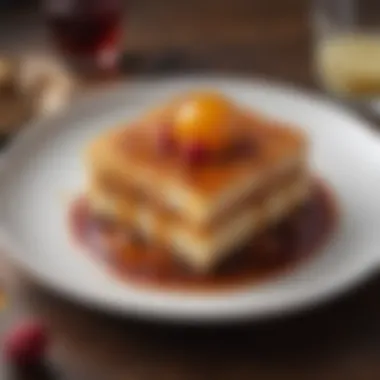
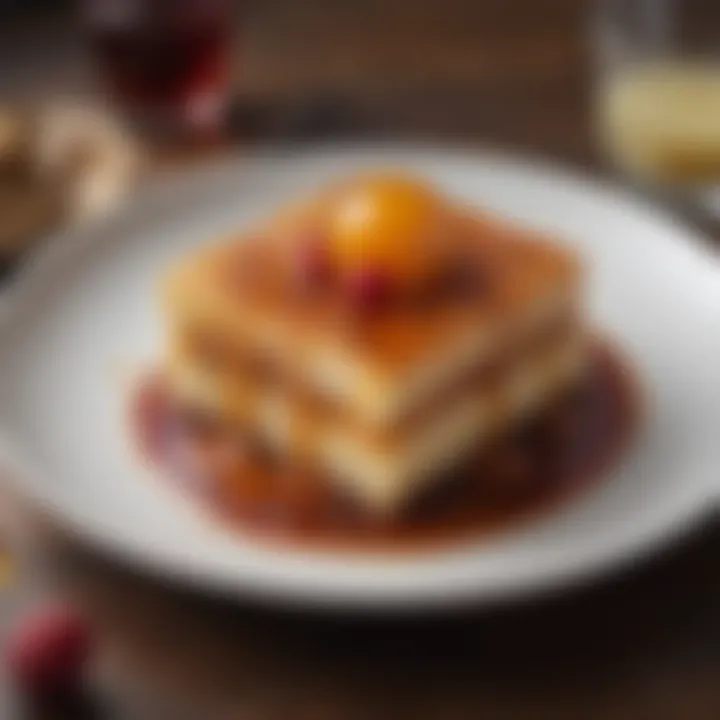
Health considerations are vital in understanding syrup alcohol. Since this unique beverage combines syrup and alcohol, the implications for health become significant. Individuals must recognize how syrup alcohol fits into their diet and lifestyle, especially concerning moderation and nutritional content. By doing so, we can enjoy its culinary delights while remaining mindful of our health choices.
Moderation and Consumption Guidelines
When consuming syrup alcohol, moderation is key. The alcohol content can vary significantly among different brands and types of syrup alcohol. Therefore, understanding portions becomes important. Here are some guidelines to consider:
- Know Your Limits: The Centers for Disease Control and Prevention suggests that moderate drinking is defined as up to one drink per day for women and up to two drinks per day for men.
- Measure Portions: Always measure servings, particularly with syrup alcohol, as its sweet taste can often mask the alcohol's strength.
- Be Mindful of Mixes: Many cocktails incorporate syrup alcohol, which may lead to overconsumption of alcohol. Mix equal parts of syrup alcohol to non-alcoholic mixers to balance the flavor and experience.
- Consider Your Setting: Enjoying syrup alcohol responsibly is crucial, especially in social settings. Being aware of surroundings can help prevent excessive drinking.
These guidelines help maintain a safe approach to enjoying syrup alcohol without the adverse effects associated with overconsumption.
Nutritional Information and Labels
Understanding the nutritional profile of syrup alcohol is essential for health-conscious individuals. While syrup alcohol can be a delightful addition to beverages and culinary creations, it is important to consider its nutritional aspects. Here are few things to look for on the labels:
- Alcohol By Volume (ABV): This indicates the strength of the product. Higher ABV means a stronger drink, which can impact how much a person should consume.
- Caloric Content: Syrup alcohol may have high sugar content, leading to increased calorie intake. Pay attention to how many calories are included per serving.
- Sugars and Carbohydrates: High sugar content can elevate blood sugar levels. Excessive sugar can lead to other health issues.
- Ingredients List: Transparency in labels can provide insights into what is contained within the syrup alcohol. Look for natural ingredients versus artificial ones.
- Health Claims: Be cautious of any health claims made on the packaging, as they may not always be validated.
In summary, knowing what is in syrup alcohol can aid in making informed decisions. Always refer to the nutritional labels before consumption.
"Moderation is not just a guideline; it is a choice. Be informed, and enjoy responsibly."
By recognizing both the consumption guidelines and nutritional values, individuals can integrate syrup alcohol thoughtfully into their diets.
Sustainability and Syrup Alcohol Production
The emphasis on sustainability within the production of syrup alcohol cannot be overstated. This focus aligns with a growing trend among consumers and producers alike, reflecting a desire to preserve the environment and enhance social responsibility in the food and beverage industry. As syrup alcohol becomes more prevalent, understanding its production methods is crucial for evaluating its overall sustainability.
Eco-Friendly Practices in Production
Adopting eco-friendly practices in the production of syrup alcohol is essential. Many producers are exploring various methods to minimize their environmental impact. Some notable practices include:
- Sourcing Ingredients Locally: Using locally sourced fruits and herbs reduces transportation emissions and supports local farmers.
- Organic Farming: Selecting organic ingredients helps avoid harmful pesticides and fertilizers that can damage ecosystems.
- Water Conservation Techniques: Efficient water usage during both the production process and in agriculture is vital. This may include rainwater harvesting and drip irrigation.
- Waste Management Strategies: Implementing recycling and composting programs helps to reduce waste generated during production. This includes reusing by-products from the fermentation process.
Incorporating these eco-friendly practices not only helps the environment but also appeals to an increasingly eco-conscious consumer base, making syrup alcohol a more sustainable choice.
Impact on Local Economies
The production of syrup alcohol plays a significant role in supporting local economies. Through the creation of jobs and the stimulation of local agriculture, it fosters economic growth in communities.
- Job Creation: The demand for syrup alcohol leads to new opportunities in farming, production, and distribution. This includes jobs related to harvesting, processing, and sales.
- Support for Farmers: Local producers often rely on nearby farms for their ingredients. This not only provides stable income for farmers but promotes diverse agricultural practices.
- Tourism and Local Events: Many regions might use syrup alcohol for local festivals or markets, drawing visitors and enhancing local culture.
"Supporting syrup alcohol production impacts not just the economy, but the very culture of the region."
Ending: The Future of Syrup Alcohol
Syrup alcohol stands at a fascinating intersection of culinary and beverage innovation. As food enthusiasts increasingly seek unique flavors and experiences, syrup alcohol emerges as a versatile ingredient. This section underscores the importance of understanding its evolution and potential applications in modern gastronomy and mixology.
As palates become more sophisticated, syrup alcohol shows promising trends. These trends not only reflect consumer interests but also pave the way for more diverse creative applications. Sustainability is a growing concern, and syrup alcohol’s production often emphasizes local sourcing and eco-friendly practices. This resonates with a consumer base that values environmental responsibility alongside taste.
Emerging Trends in Syrup Alcohol
Currently, various trends shape the future of syrup alcohol. One notable direction is the rise of craft syrup alcohol. Similar to craft beers, small-scale producers are exploring unique local ingredients. This artisanal approach leads to exciting flavor profiles that attract foodies and cocktail aficionados.
Another trend is the integration of syrup alcohol into health-conscious beverages. Many producers are experimenting with lower-sugar options or organic ingredients. These choices provide a means for consumers to indulge thoughtfully, without sacrificing flavor.
Some of the prominent trends include:
- Fusion Flavors: Combining different cultural elements to create novel syrup alcohol varieties.
- Culinary Collaborations: Chefs and mixologists partnering to create exclusive syrups.
- Barrel-Aged Syrups: Aging syrup alcohol in various barrels to add depth and complexity.
Final Thoughts on Its Culinary Role
Syrup alcohol plays a vital role beyond merely offering a drink. It enhances dishes and allows exploration of flavor. Its versatility makes it suitable in both savory and sweet applications, enriching gastronomy.
The future of syrup alcohol lies in innovation, sustainability, and its potential to enhance culinary experiences.
Understanding syrup alcohol's multifaceted nature will empower food lovers and chefs to explore this ingredient further. The journey through its uses and benefits is just beginning.







